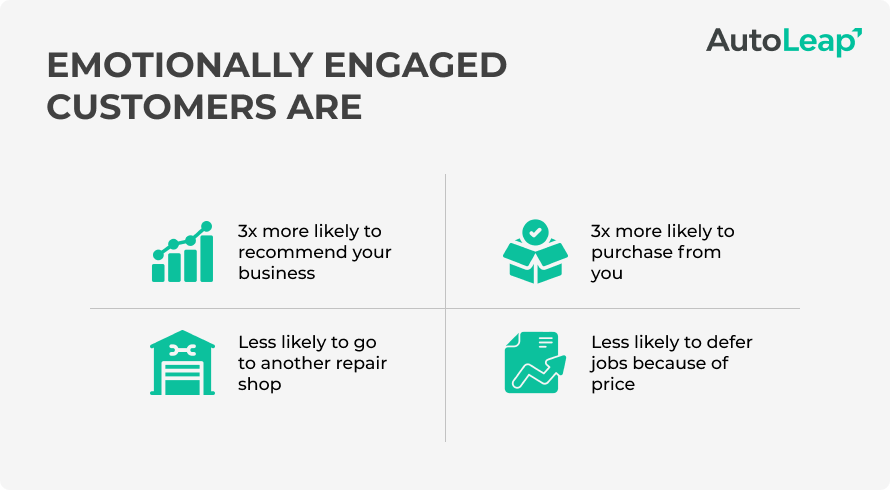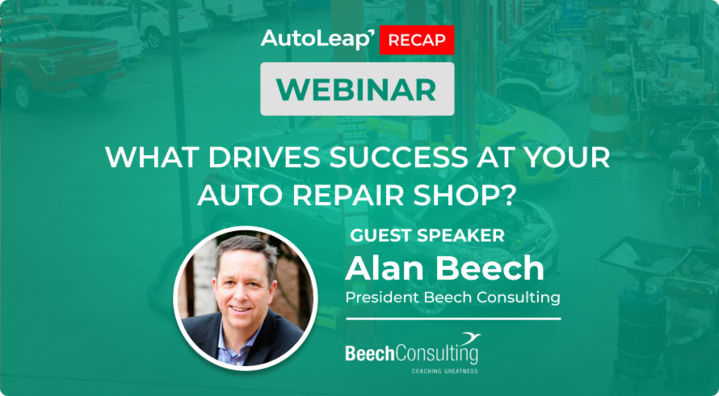Many auto repair shop owners fail to realize that ONLY fixating on financial targets won’t make their business a success.
“There’s a belief among technicians that if I have a fair price and pull the wrench faster, I’ll make more money,” says Alan Beech in a recent webinar hosted by AutoLeap. Beech has over 15 years of industry experience and offers advisory services to repair shops through his company, Beech Consulting. He adds that there’s a lot more to running a successful business than doing just that.
Beech recalls that growing up, his mother had a car that broke down all the time. A mechanic helped them maintain it, and they relied on him to get everything done. What stuck with Beech through this experience was the long-term relationship that mechanic was able to build through excellent no-nonsense service—putting in the effort to build these relationships results in repeat business as well as increases the likelihood of referrals.
How important is customer satisfaction?
“When customers talk about your business and use terms like, ‘I have confidence in that shop,’ it develops a relationship with that shop,” says Beech. A business grows when customers develop an emotional connection with it, he says.
According to Beech, a loyal customer visits your shop at least twice a year and spends a minimum of $400 during each trip. He analyzed a customer’s behavior at an auto repair shop over the course of three years. They initially spent around $380 in the first year, but the average repair order size per visit rose to $550 by the third year.
How did this affect the shop’s revenue? The business grew 20% during this time. The shop achieved these numbers by building bonds with its customers. This not only includes providing the best service, but knowing how to deal with unhappy customers at your auto repair shop.
Strategies to create long-term relationships with customers
The image below summarizes some key benefits of developing an emotional connection with your customers:

How do you bond with someone who wants to get the best value for money? Beech talks of two strategies for engaging customers:
1. The plus-one strategy
“It’s the ability to obtain customer intelligence and utilize that to personalize their experience,” explains Beech.
The goal is for customers to wonder how the shop knew and did exactly what they wanted. An excellent way for auto repair shops to do this is by understanding their customers. Beech recommends memorizing customers’ names and what they expect from your shop during their visits.
Regarding developing customer intelligence, Beech adds, “It may be as simple as a customer telling you that they missed an appointment because one of their family members is in the hospital.” He says that you can use this intelligence to write a “get well soon” card to them.
Now the question is—how do you offer plus ones?
Alan Beech has an acronym for doing so—FORD. No, you don’t have to buy a new Ford vehicle. It stands for:
- F for family
- O for occupation
- R for recreation
- D for dreams
If a customer comes in and talks about any of the above four, you can understand what matters to them. You need to care about what customers say instead of brushing it off in order to build that connection.
Similarly, following up on things that your customers tell you regarding their family members, such as their children going to college, can make them feel cared for. Things you do for customers in the plus-one strategy should not cost much money. Doing something that shows you care about them is important—the dollar value of the action isn’t.
The customer in the above video will probably take that car to the same shop when it needs work since he has an emotional connection with it. Automotive repair software platforms like AutoLeap allow you to take detailed notes about each customer—you can use this notes section to not only keep track of the customer’s vehicle, but also of what matters most to them personally.
2. Above and beyond
Alan Beech says, “This is where you take your standard procedures and go a step further based on the circumstances.” For instance, if you vacuum a car and add air fresheners in the cabin, you may want to go the extra mile and wash the whole car and wax it too.
“In my shop, we washed every car inside and out. Because we learned after doing it a few times that the response was so powerful with the client that we made it part of our process to do it every time. And when you do it, the client starts to expect that,” says Beech.
Building customer loyalty at your auto repair shop
Here are a few tips from Alan Beech to try at your workshop:
Have daily 10-minute huddles
Introduce the topic of “plus-ones” and “above and beyond” during your first meetings to better manage your mechanic shop. “And ask your team for examples of it,” adds Alan Beech. “You may go two weeks, and nobody will tell a story. You’ll have to plant the seed and tell a story of situations where you did it.”
Beech says that after a few meetings, there will be one employee who says that they’ve done a plus-one and others will bring up their own stories. Soon each employee will try to one-up the other over who delivered the best plus-one. This is an effective strategy that most shops are not using. An AutoLeap webinar poll revealed that 86% of shops have never implemented a 10-minute huddle, but Beech suggests that they can be a game-changer for your shop.
According to Beech, a morning huddle ensures that all employees reach work on time and know what lies ahead in the day. This can help build team spirit among the employees.
Understand the customer
Knowing a customer’s background allows you to better cater to them. Details about their history and daily lives can give you plenty to tailor the experience specifically to their needs.
Closing thoughts
Alan Beech says, “Are we creating a culture within our companies where we will deliver an amazing emotional experience?” Change starts from within your shop and drives results from external stakeholders. Creating a positive organizational culture translates into happy and loyal customers, resulting in a successful business.








